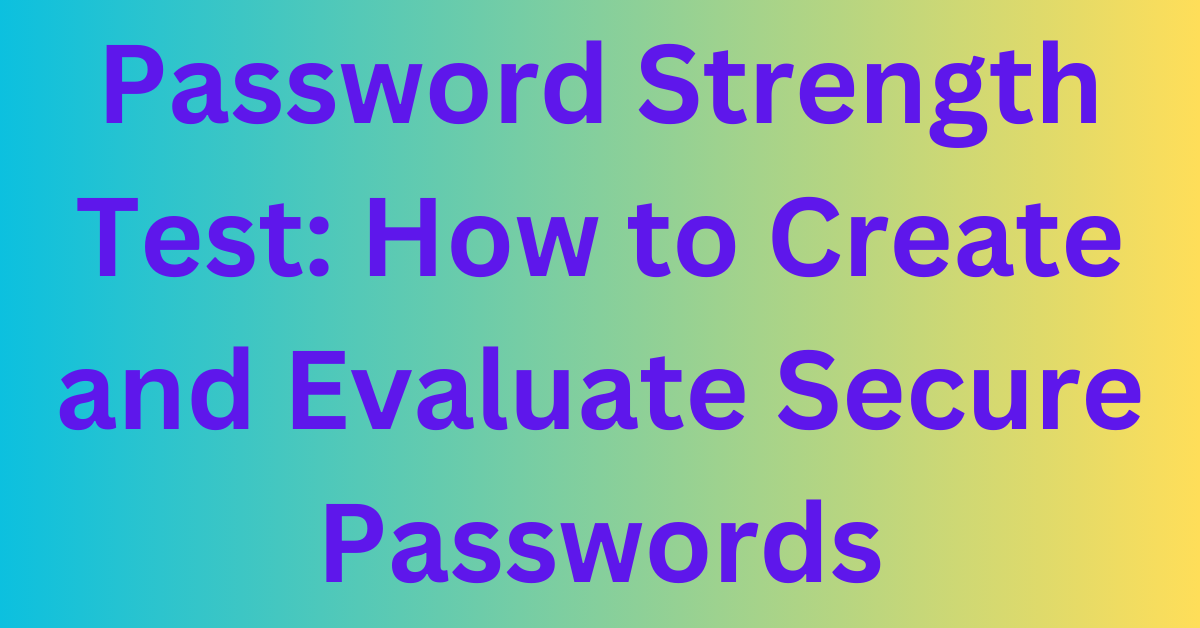
27
Password Strength Test: How to Create and Evaluate Secure Passwords
A password strength test evaluates how secure a password is by analyzing factors like length, complexity, and uniqueness. This guide explores what makes a password strong, how to test it, and tools to ensure your online accounts stay protected. By understanding password strength metrics and using reliable testing tools, you can safeguard your digital security effectively.
Password Strength Test: How to Create and Evaluate Secure Passwords
Summary
A password strength test evaluates how secure a password is by analyzing factors like length, complexity, and uniqueness. This guide explores what makes a password strong, how to test it, and tools to ensure your online accounts stay protected. By understanding password strength metrics and using reliable testing tools, you can safeguard your digital security effectively.
Keywords: password strength test, secure passwords, password security, strong password checker, password complexity, online security, password generator, cybersecurity tips, password evaluation, data protection
What is a Password Strength Test?
A password strength test is a tool or method used to assess how resistant a password is to hacking attempts, such as brute force or dictionary attacks. These tests analyze factors like:
- Length: Longer passwords are harder to crack.
- Character Variety: Including uppercase, lowercase, numbers, and symbols.
- Uniqueness: Avoiding common words, phrases, or predictable patterns.
- Entropy: A measure of randomness, making passwords less guessable.
Strong passwords are essential for protecting sensitive accounts, from banking to social media, as weak passwords are a leading cause of data breaches.
Why Password Strength Matters
Weak passwords are a hacker’s dream. According to a 2024 cybersecurity report, 80% of data breaches involve compromised passwords. A strong password reduces the risk of:
- Unauthorized account access.
- Identity theft.
- Financial loss.
- Data leaks.
A password strength test helps identify vulnerabilities before they’re exploited, ensuring your accounts remain secure.
How Password Strength is Measured
Password strength is evaluated based on several criteria. Here’s a breakdown:
Criteria
Description
Impact on Strength
Length | Number of characters in the password. Minimum 12-16 characters recommended. | Longer = Stronger
Character Types | Mix of uppercase, lowercase, numbers, and special characters (e.g., !, @, #). | More variety = Stronger
Unpredictability | Avoiding common words, names, or patterns (e.g., "1234" or "password"). | Less predictable = Stronger
Entropy | Measure of randomness, calculated in bits. Higher entropy = harder to guess. | Higher entropy = Stronger
Example of Password Strength
- Weak: "password123" (short, predictable, low entropy)
- Moderate: "SunnyDay2025" (decent length, some variety, but uses common words)
- Strong: "X9#mP$2vL!qR7z" (long, random, high entropy)
Top Tools for Testing Password Strength
Several online tools and built-in features can evaluate your password’s strength. Here are some reliable options:
- LastPass Password Strength Test: Checks length, variety, and uniqueness with a user-friendly interface.
- NordPass Password Checker: Provides a strength score and estimated crack time.
- Bitwarden Password Generator: Includes a strength tester alongside a random password generator.
- Kaspersky Password Checker: Estimates how long it would take to crack your password.
- Browser-Based Checkers: Many browsers like Chrome and Firefox flag weak passwords during account creation.
Pro Tip: Always use trusted tools to avoid sharing passwords with malicious sites.
How to Create a Strong Password
Follow these steps to craft a secure password:
- Aim for 16+ Characters: Longer passwords are exponentially harder to crack.
- Mix Character Types: Use uppercase (A-Z), lowercase (a-z), numbers (0-9), and symbols (!@#$%).
- Avoid Personal Info: Don’t include names, birthdays, or addresses.
- Use Random Patterns: Consider passphrases like “Blue!Tiger#Coffee9” for memorability and strength.
- Leverage Password Managers: Tools like LastPass or 1Password can generate and store complex passwords securely.
Common Mistakes to Avoid
- Reusing Passwords: Using the same password across multiple sites increases risk.
- Using Dictionary Words: Words like “apple” or “love” are easily guessed.
- Ignoring Updates: Not changing passwords periodically can leave accounts vulnerable.
- Storing Passwords Unsafely: Avoid writing passwords in plain text or sharing them via email.
FAQs About Password Strength Tests
What is a good password strength score?
A good password strength score typically indicates a password with at least 12-16 characters, mixed character types, and high entropy. Tools often rate passwords as “weak,” “moderate,” or “strong” based on these factors.
How often should I test my password strength?
Test your password strength whenever you create a new account or update an existing password. Regularly auditing passwords (every 6-12 months) ensures ongoing security.
Are online password checkers safe?
Most reputable password checkers (e.g., from LastPass or Kaspersky) are safe, but avoid entering passwords on unknown or untrusted websites to prevent phishing risks.
Can a password manager replace a strength test?
Password managers often include built-in strength tests and generate secure passwords automatically, making them a great all-in-one solution.
What’s the difference between a password and a passphrase?
A password is typically a single string (e.g., “K!9mPx2”), while a passphrase is a longer sequence of random words (e.g., “Cloud!River$Moon9”). Passphrases are often easier to remember and equally secure.
Conclusion
A password strength test is your first line of defense against cyber threats. By using long, complex, and unique passwords, and testing them with reliable tools, you can significantly enhance your online security. Avoid common pitfalls like reusing passwords or using predictable patterns, and consider a password manager for convenience and safety. Stay proactive—test your passwords today to protect your digital life.
Contact
Missing something?
Feel free to request missing tools or give some feedback using our contact form.
Contact Us